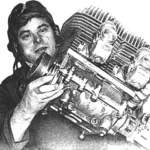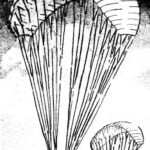It would seem that there is nothing complicated in the design of a bicycle driven by the energy of the sun: install a solar battery of the required capacity and a simple electric motor – and you have a completely environmentally friendly vehicle. And when the sun hides behind the clouds, it doesn’t matter, because you can continue the route the old fashioned way, pedaling. However, as often happens: in theory everything seems easy and simple, but when you move on to practice, many problems immediately arise. Same with the “solar bike”…
For a positive energy balance, solar vehicles (or, as they are also called, solar bicycles) require solar panels of a large area, which accordingly increases the weight of the structure and increases its cost. Therefore, despite the fact that the first experimental models were built back in 1955, they still have not received wide distribution, remaining the lot of amateur enthusiasts. There are even solar car races around the world, but some of these cars cost almost as much as an airplane, and they can hardly be used as an everyday means of transportation. Heliobicycles made in Europe or China, which are relatively simple in design, have limited capabilities and can travel no more than 50 km without recharging.


In our country, work on the design of an affordable and efficient solar car was led for a long time by Valery Stepanovich Galushchak, associate professor of the Kamyshin Technological Institute (a branch of VolgTU). About 20 years ago, he created a student design bureau, one of the leading areas of which was the development of light vehicles using “solar drive”. Unfortunately, Valery Stepanovich died from coronavirus last year, but his work lives on: he managed to train talented specialists who continue their research. One of these new experimental models, the “Tourist” sun skate, was presented at the Technosreda festival by young designer Ivan Bogdanov.
The hardest part about designing solar vehicles is getting the energy balance right. In the “Tourist” solar panel, the solar battery produces approximately the same amount of current as the electric motor consumes. The power of the panels, which also serve as the roof of the vehicle, is 300 W. Energy from the batteries is transferred to a lithium-ion battery located at the rear of the car. A 1 kW driving wheel motor is installed at the front, which receives energy from the battery through a controller. Maximum energy consumption at a cruising speed of 35 km/h when driving on a flat surface is 200 W. A recovery mode is also provided.

The suncat’s design uses a three-wheeled design, which significantly reduces weight and reduces energy losses compared to four-wheeled vehicles. Control is carried out by turning the rear wheels using two handles installed on the side of the driver’s seat. The rear wheel suspension is independent, lever-spring. The braking system is cable driven and drives the rear wheels. LED optics are available for driving on public roads.
Since the sun scooter “Tourist” was originally designed for long-distance travel (the name suggests this), its design is based on a durable metal frame. Of course, aluminum would be lighter, but practice has shown that on our roads the quality is far from being the best (and in some places they are not at all), steel is more reliable. In addition, in the event of a breakdown, the steel frame can be welded in any workshop. The suncat’s weight is 37 kg – not so much, so even with a bicycle drive it accelerates well and handles well. With an eye on long trips, there is a comfortable seat, and in the rear there is a spacious luggage compartment that can accommodate camping equipment and food supplies.
The first tests of the vehicle showed that in summer, in the conditions of central Russia, it is capable of moving solely using solar energy from approximately 10 a.m. to 5 p.m. at a cruising speed of 35 km/h. Then she can travel another 30-50 km using the energy accumulated in the battery, then she will have to pedal further. And at the latitude of Murmansk in the summer on a sunny day it can be operated around the clock.

“Tourist” was tested on a long run along the Volgograd-Sevastopol route with a length of 1,350 km, where all the calculated characteristics were confirmed. In one day, participants covered an average of about 170 km. Despite the difficult mountainous sections encountered along the way, there were no serious breakdowns.
The Solntskat is really easy to use, and at the demonstration site of the Technosreda festival, primary school children easily mastered it in just a couple of minutes. It is clear that a driver’s license is not required to drive this vehicle.

Currently, Ivan Bogdanov has developed a whole family of solar panels, adapted for various operating conditions. Among them is the suncatcher “Farmer”. As the name implies, this model was designed for use in rural areas, so it has a reinforced chassis and a spacious platform that allows it to transport cargo weighing up to 50 kg. The operation scheme of this vehicle is as follows: morning drive to work in the field (garden, vegetable garden, etc.) – daytime parking, during which the battery is charged using solar energy – evening drive home with a load of harvest. For this mode of use, a large battery is not needed; it is enough to provide a power reserve of 50-70 km. “Farmer” also performed well in an urban environment; it is very convenient to drive to and from work.

Not stopping there, the inventor is designing other versions of vehicles powered by solar energy. For example, he plans to build in the near future an all-wheel drive “helio-SUV”, which… However, this is a topic for a separate publication!
Andrey NIKITIN, photo by the author and Ivan BOGDANOV



